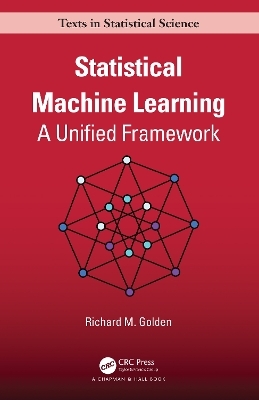
Statistical Machine Learning
CRC Press (Verlag)
978-1-138-48469-6 (ISBN)
The recent rapid growth in the variety and complexity of new machine learning architectures requires the development of improved methods for designing, analyzing, evaluating, and communicating machine learning technologies. Statistical Machine Learning: A Unified Framework provides students, engineers, and scientists with tools from mathematical statistics and nonlinear optimization theory to become experts in the field of machine learning. In particular, the material in this text directly supports the mathematical analysis and design of old, new, and not-yet-invented nonlinear high-dimensional machine learning algorithms.
Features:
Unified empirical risk minimization framework supports rigorous mathematical analyses of widely used supervised, unsupervised, and reinforcement machine learning algorithms
Matrix calculus methods for supporting machine learning analysis and design applications
Explicit conditions for ensuring convergence of adaptive, batch, minibatch, MCEM, and MCMC learning algorithms that minimize both unimodal and multimodal objective functions
Explicit conditions for characterizing asymptotic properties of M-estimators and model selection criteria such as AIC and BIC in the presence of possible model misspecification
This advanced text is suitable for graduate students or highly motivated undergraduate students in statistics, computer science, electrical engineering, and applied mathematics. The text is self-contained and only assumes knowledge of lower-division linear algebra and upper-division probability theory. Students, professional engineers, and multidisciplinary scientists possessing these minimal prerequisites will find this text challenging yet accessible.
About the Author:
Richard M. Golden (Ph.D., M.S.E.E., B.S.E.E.) is Professor of Cognitive Science and Participating Faculty Member in Electrical Engineering at the University of Texas at Dallas. Dr. Golden has published articles and given talks at scientific conferences on a wide range of topics in the fields of both statistics and machine learning over the past three decades. His long-term research interests include identifying conditions for the convergence of deterministic and stochastic machine learning algorithms and investigating estimation and inference in the presence of possibly misspecified probability models.
Richard M. Golden (Ph.D., M.S.E.E., B.S.E.E.) is Professor of Cognitive Science and Participating Faculty Member in Electrical Engineering at the University of Texas at Dallas. Dr. Golden has published articles and given talks at scientific conferences on a wide range of topics in the fields of both statistics and machine learning over the past three decades. His long-term research interests include identifying conditions for the convergence of deterministic and stochastic machine learning algorithms and investigating estimation and inference in the presence of possibly misspecified probability models.
Part I: Inference and Learning Machines. 1. A Statistical Machine Learning Framework 2. Set Theory for Concept Modeling 3. Formal Machine Learning Algorithms Part II: Deterministic Learning Machines 4. Linear Algebra for Machine Learning 5. Matrix Calculus for Machine Learning 6. Convergence of Time-Invariant Dynamical Systems 7. Batch Learning Algorithm Convergence Part III: Stochastic Learning Machines 8. Random Vectors and Random Functions 9. Stochastic Sequences 10. Probability Models of Data Generation 11. Monte Carlo Markov Chain Algorithm Convergence 12. Adaptive Learning Algorithm Convergence Part IV: Generalization Performance 13. Statistical Learning Objective Function Design 14. Simulation Methods for Evaluating Generalization 15. Analytic Formulas for Evaluating Generalization 16. Model Selection and Evaluation
| Erscheinungsdatum | 15.06.2020 |
|---|---|
| Reihe/Serie | Chapman & Hall/CRC Texts in Statistical Science |
| Zusatzinfo | 1 Tables, black and white |
| Verlagsort | London |
| Sprache | englisch |
| Maße | 178 x 254 mm |
| Gewicht | 3170 g |
| Themenwelt | Informatik ► Theorie / Studium ► Künstliche Intelligenz / Robotik |
| Mathematik / Informatik ► Mathematik ► Statistik | |
| ISBN-10 | 1-138-48469-5 / 1138484695 |
| ISBN-13 | 978-1-138-48469-6 / 9781138484696 |
| Zustand | Neuware |
| Informationen gemäß Produktsicherheitsverordnung (GPSR) | |
| Haben Sie eine Frage zum Produkt? |
aus dem Bereich


